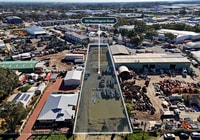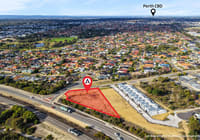
Lendlease sells US construction business days after strategy reset
Lendlease has struck a deal to sell its construction business in the United States just three days after unveiling a $4.5 billion plan to pull back from its offshore operations.
The ASX-listed development giant told investors it had agreed to a deal with Consigli Constructions for the sale of its US East Coast operations. That business includes around 45 current, under contract and pre-construction projects.
The majority of Lendlease’s US construction workforce will transition to Consigli.

Lendlease has not disclosed the value of the deal but has previously said it expects to write down goodwill associated with its international building business as it divests operations in the US and in the United Kingdom.
“Today’s announcement represents another step to simplify Lendlease to create a more focused company for security holders,” Lendlease chief executive Tony Lombardo said.
“It’s the culmination of more than 12 months’ work refining our US construction activities to focus on the US East Coast where we have a clear competitive advantage. The sale represents a great outcome for both our people, the majority of whom will move across to Consigli, and for our customers.”
The sell-down closes a significant corporate chapter for Lendlease, which first entered the US in the 1970s through its construction business, which was bolstered with the acquisition of Bovis in 1999. Lendlease said this week that the value of goodwill associated with the Bovis deal – both in the US and UK – along with deferred tax assets, and other costs could total between $625 million and $775 million in write-downs.
Lendlease expects to record $2.8 billion in proceeds from the divestment of various overseas assets, while also recording close to $1.5 billion in impairments by next year.
Mr Lombardo and Lendlease chairman Michael Ullmer set out a radical restructure of the once-dominant global developer this week as its major investors, including super fund giant Aware Super, grew increasingly restive over the pace of an overhaul.
Under the new plan, Lendlease will sell its international construction business and progressively divest its development assets abroad which include major projects slated for the US, UK and continental Europe.
That plan was quickly endorsed by investors, who sent shares up eight per cent after Mr Lombardo set out the transformation plan on Monday. Lendlease opened 2.4 per cent, or 15¢, lower on Wednesday, and was trading at $6.09.
Lendlease is behind developments in Malaysia, the US, Italy and the UK, many of which were conceived when interest rates were lower. As the monetary cycle turned, however, Lendlease was stuck with unprofitable or hard-to-fund developments.
To expedite these exits, Lendlease has unveiled a “capital release unit” that will house the overseas projects ripe for sale out to June 2028.
Further to this, at least eight developments in the US, Europe and Singapore will be followed through to completion, worth $7.3 billion to its balance sheet as funds under management once they are ready to accept tenants. The company could subsequently sell-down its interests in these ventures, while preserving the recurring fee income.
In a note to investors, Morningstar equity analyst Alexander Prineas said that the company was likely relinquishing “some of the value in Lendlease’s very long-term development projects”.
“On the upside, we think it offers the benefit of greater certainty, reduced risks, and potentially quicker recognition of the value we see,” Mr Prineas said. “Possible catalysts to unlock the value include asset sales, a simplified business, and a proposed capital return to shareholders once certain milestones are met.”
As capital is released from those divested projects and operations, Lendlease then plans to launch an initial $500 million buyback of shares.
“While this is positive, it will be reliant on progress on asset sales, and given long-dated timing on some of the asset sales, we believe not much activity may be seen on the buyback near term,” Citi analyst Suraj Nebhani wrote this week.











